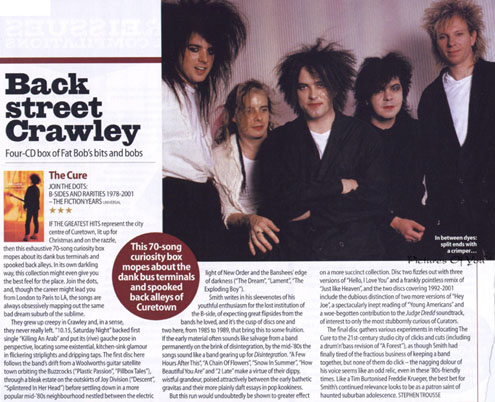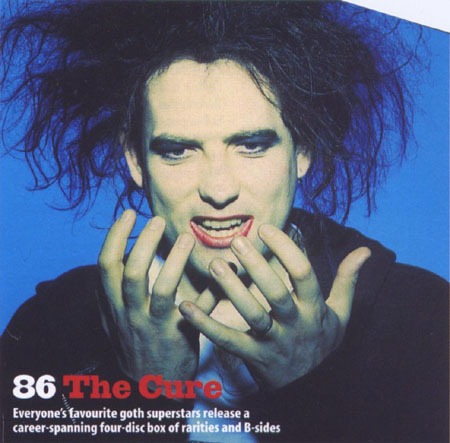"Join The Dots" Review


BACK STREET CRAWLEY
February
2004 - Uncut (UK)
"Join The Dots" Review


BACK STREET CRAWLEY
Four-CD box of Fat Bob's bits and bobs - *** (rated 3 stars out of a possible 5)
If The
Greatest Hits represent the city centre of Curetown, lit up for Christmas and on
the razzle, then this
exhaustive 70-song curiosity box mopes about its dank bus terminals and spooked
back alleys. In its own darkling
way, this collection might even give you the best feel for the place. Join the
dots, and, though the career might lead
you from London to Paris to LA, the songs are always obsessively mapping out the
same bad dream suburb of the
sublime.
They grew
up creepy in Crawley and, in a sense, they never really left. "10.15 Saturday
Night" backed first single
"Killing An Arab" and put its (rive) gauche pose in perspective, locating some
existential, kitchen-sink glamour in
flickering striplights and dripping taps. The first disc here follows the band's
drift from a Woolworths guitar
satellite town orbiting the Buzzcocks ("Plastic Passion, "Pillbox Tales"),
through a bleak estate on the outskirts of
Joy Division ("Descent", "Splintered In Her Head") before settling down in a
more popular mid-'80s
neighbourhood nestled between the
electric light of New Order and the Banshees' edge of darkness ("The
Dream", "Lament", "The Exploding Boy").
Smith
writes in his sleevenotes of his youthful enthusiasm for the lost institution of
the B-side, of expecting great
flipsides from the bands that he loved, and it's the cusp of discs one and two
here, from 1985 to 1989, that bring this
one to some fruition. If the early material often sounds like salvage from a
band permanently on the brink of
disintegration, by the mid-'80s the songs sound like a band gearing up for
Disintegration. "A Few Hours After
This", "A Chain Of Flowers", "Snow In Summer", "How Beautiful You Are" and "2
Late" make a virtue of their
dippy, wistful grandeur, poised attractively between the early bathetic gravitas
and their more plainly daft essays in
pop kookiness.
But this
run would undoubtedly be shown to greater effect on a more succint collection.
Disc two fizzles out with
three versions of "Hello, I Love You" and a frankly pointless remix of "Just
Like Heaven", and the two discs
covering 1992-2001 include the dubious distinction of two more versions of "Hey
Joe", a spectacularly inept
reading of "Young Americans" and a woe-begotten contribution to the Judge Dredd
soundtrack, of interest to only
the most stubbornly curious of Curators.
The final
disc gathers various experiments in relocating The Cure to the 21st-century
studio city of clicks and cuts
(including a drum'n'bass revision of "A Forest"), as though Smith had finally
tired of the fractious business of
keeping a band together, but none of them do click - the nagging dolour of his
voice seems like an odd relic, even in
these '80s-friendly times. Like a Tim Burtonised Freddie Kreuger, the best bet
for Smith's continued relevance
seems to be as patron saint of haunted suburban adolescence.
STEPHEN TROUSSE